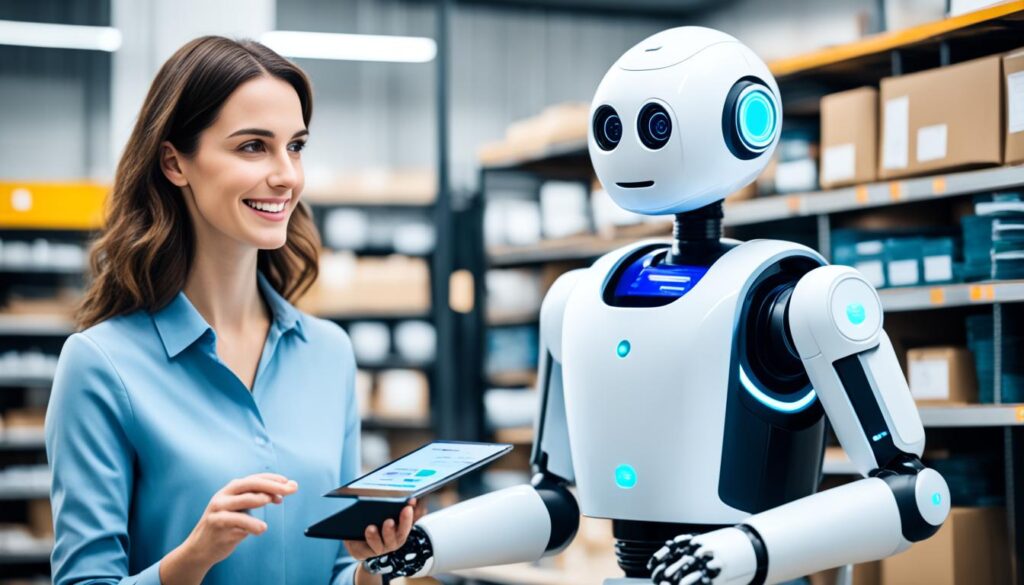Today, small business owners face many challenges, like tough competition and high customer demands. But, AI technology could change how small businesses work. It offers many chances to make things more efficient, help with making decisions, and grow in a sustainable way.
This guide will show how AI can help small business owners. We’ll look at how AI can make operations smoother, give valuable insights, and help you stand out in the market. We’ll cover things like predictive analytics, understanding customer behavior, natural language processing tools, and smart automation.
If you’re an entrepreneur, a service provider, or a retailer, this guide is for you. It will give you the knowledge and strategies to use AI’s power. This can help take your small business to new heights.
Key Takeaways
- Discover how AI can revolutionize small business operations by enhancing productivity, improving decision-making, and driving growth.
- Explore a wide range of practical AI applications, including predictive analytics, customer behavior analysis, natural language processing tools, and intelligent automation.
- Learn strategies to effectively implement and leverage AI technology to optimize workflows, enhance customer service, and gain a competitive edge in the market.
- Understand the benefits of AI adoption for small business owners, such as increased efficiency, better decision-making, and data-driven insights.
- Gain insights into the latest trends and emerging AI technologies that can shape the future of small businesses.
Introduction to AI for Small Businesses
In today’s fast-changing business world, artificial intelligence (AI) is a key technology. It gives small businesses a way to stand out. It’s important for small business owners to know about AI and its benefits.
What is AI and Why It Matters
AI means making computers do tasks that usually need human smarts, like learning and solving problems. It uses machine learning and natural language processing. This lets small businesses automate tasks, understand data better, and improve how they talk to customers.
Benefits of AI for Small Business Owners
- Increased Efficiency: AI can make business tasks easier, giving small business owners more time for important tasks.
- Enhanced Customer Experience: AI chatbots and personalized tips can make customers happier and more loyal.
- Data-Driven Decision Making: AI gives small businesses useful insights, helping them make smart choices for growth.
- Competitive Advantage: Using AI, small businesses can stay ahead, using new tech to compete with big companies.
Small business owners face many challenges and chances today. Knowing and using AI can change the game. By using AI, small businesses can do better, make customers happy, and set themselves up for success.

AI for Small Business: Machine Learning Applications
Small business owners face many challenges today. Using artificial intelligence (AI) is key to success. Machine learning, a part of AI, helps by finding important information in data. It gives small businesses big advantages, like better predictions and more personal customer experiences.
Predictive Analytics and Forecasting
Machine learning helps small businesses make smart choices and predict the future. It looks at past sales, customer habits, and market changes. This way, it can predict sales and help with planning and managing resources.
This foresight lets small businesses stay quick and flexible. They can easily adjust to new market trends.
Customer Behavior Analysis
Machine learning is also great for understanding what customers want. By analyzing customer data, small businesses can learn about their likes, what they buy, and what troubles them. This info helps make marketing better, improve the customer experience, and create products that customers love.
Machine learning gives small businesses a big advantage. It helps them make smart choices, see market changes, and give customers what they want. By using these AI tools, small businesses can grow and succeed for a long time.

| Machine Learning Applications | Benefits for Small Businesses |
|---|---|
| Predictive Analytics | Accurate forecasting, strategic planning, and data-driven decision making |
| Customer Behavior Analysis | Personalized marketing, optimized customer experiences, and product/service development |
Natural Language Processing Tools for Small Businesses
As a small business owner, you’re always looking for ways to make things easier and connect better with your customers. Thanks to natural language processing (NLP), new tools have come along that change how you talk and work with your clients. Let’s see how NLP can change your small business for the better.
NLP lets you use chatbots and virtual assistants, which are powered by AI. These tools can do many customer service jobs, like answering common questions or helping with tough tasks. This means your team can focus on big projects while making sure customers get quick help.
Also, NLP gives you deep insights into what your customers like and don’t like. By looking at how they talk, you can learn about their likes, dislikes, and feelings. This info helps you make better products, market smarter, and make decisions that hit the mark with your customers.
| NLP-Powered Tool | Key Benefits for Small Businesses |
|---|---|
| Chatbots | Automated customer service, 24/7 availability, consistent responses |
| Virtual Assistants | Task automation, calendar management, voice-based interactions |
| Sentiment Analysis | Understand customer sentiment, identify pain points, enhance customer experience |
For small business owners, using NLP tools can really set you apart. It makes things run smoother and builds stronger customer ties. With AI-driven chat, you open up new chances for growth and success.
“Integrating natural language processing into our small business has been a game-changer. It has allowed us to provide personalized support, automate repetitive tasks, and gain valuable insights about our customers.”
AI for small busines
As a small business owner, you’re always looking for ways to make things easier and more efficient. Luckily, artificial intelligence (AI) can help. AI-powered automation software and intelligent process automation are changing how small businesses work. They save time and resources.
AI can quickly and accurately handle tasks that take up a lot of time. This includes things like data entry, managing documents, scheduling, and helping customers. With robotic process automation (RPA), these tasks are taken care of. This lets your team focus on things that help your business grow.
AI does more than just automate tasks. Chatbots can give customers fast and personalized help any time of the day. This makes customers happier and helps your team deal with harder problems.
| AI-Powered Automation | Benefits for Small Businesses |
|---|---|
| Robotic Process Automation (RPA) | Streamlines repetitive tasks, improves efficiency, and reduces errors |
| Chatbots | Enhances customer service, provides instant support, and boosts productivity |
| Intelligent Workflow Optimization | Identifies inefficiencies, optimizes processes, and drives continuous improvement |
Using AI-driven automation software and intelligent process automation, small businesses can do more, work better, and make customers happier. Keep an eye on new AI technologies and trends to keep improving your business.
Automation Software and Intelligent Process Automation
Small business owners can change the game by using automation software and intelligent process automation. Technologies like robotic process automation (RPA) and chatbots can make operations smoother and customer service better.
Robotic Process Automation (RPA)
Robotic process automation (RPA) automates tasks that need to be done over and over. It lets small businesses work more efficiently and productively. By giving these tasks to digital “robots,” your team can focus on important work.
RPA can do many tasks, like data entry, invoice processing, email management, and customer onboarding. It does these tasks fast and accurately.
Chatbots for Customer Service
Customer service is key in today’s fast business world. Chatbots use natural language processing and machine learning to offer quick and personalized help. They can answer customer questions, like order tracking and troubleshooting, any time.
By automating customer service, chatbots make responses faster, cut costs, and improve the customer experience.
Exploring AI-powered automation, like RPA and chatbots, can help small businesses. These tools can make operations smoother, improve customer service, and help businesses grow.
| Feature | Robotic Process Automation (RPA) | Chatbots |
|---|---|---|
| Purpose | Automate repetitive, rule-based tasks | Provide efficient and personalized customer service |
| Key Capabilities |
|
|
| Benefits for Small Businesses |
|
|
Data Analytics Solutions and Business Intelligence
Small business owners now need to use AI-driven data analytics and business intelligence tools. These tools give valuable insights and help make decisions based on data. They also open up new ways to grow.
Data Visualization and Reporting
Data visualization and reporting are key to a strong data analytics plan. They turn complex data into easy-to-understand visuals. This helps small businesses spot trends and chances for growth they might have missed.
Tools like interactive dashboards and infographics help small business owners:
- Understand their company’s performance quickly
- Find areas to get better
- Share insights with stakeholders, employees, and customers easily
With detailed reporting, these tools let small business owners make smart, data-based choices. These choices help their businesses grow and succeed over time.
“Data is the new oil. It’s valuable, but if unrefined it cannot really be used. It has to be transformed into insight and knowledge.”
– Gartner
By using data analytics solutions and business intelligence tools, small business owners can compete with confidence. They make decisions based on data, setting their businesses up for long-term success.
Cognitive Computing and AI-Powered Decision Making
In the world of small business, cognitive computing and AI are changing how owners plan and solve problems. Cognitive computing lets AI systems look at complex data, find patterns, and give insights. This helps owners make smarter business choices.
AI-powered decision making is great at looking at lots of info and spotting trends. Small business owners can use this to understand customers better, know the market, and improve how things run. This leads to decisions that match their business goals.
For example, AI can predict what customers will want, help manage stock, and adjust supply chains early. NLP helps by looking at what customers say, finding out what they don’t like, and making things better for them.
| Benefits of Cognitive Computing for Small Businesses | Examples |
|---|---|
| Pattern recognition and data analysis | Identifying trends in customer behavior, sales, and market conditions |
| Predictive modeling and forecasting | Anticipating customer demand, optimizing inventory, and improving supply chain management |
| Natural language processing (NLP) | Analyzing customer feedback, identifying pain points, and enhancing customer service |
| Automated decision-making and recommendations | Providing data-driven insights to support strategic business decisions |
By using cognitive computing and AI-powered decision making, small business owners can get ahead. They make better choices and grow their businesses. As AI gets better, small businesses will have more ways to use it. This will help them succeed in a fast-changing world.
Overcoming Challenges in AI Adoption for Small Businesses
AI offers many benefits for small businesses, but there are challenges too. Owners need to think about cost, resources, finding talent, and training staff for AI success. This ensures AI works well and helps the business grow over time.
Cost and Resource Considerations
Starting with AI can cost a lot for small businesses. The price of AI systems, setup, and integration is high. Owners must think about if the AI will bring back more money and meet their needs and budget. They also need to consider ongoing costs for upkeep, updates, and IT support.
Talent Acquisition and Training
For AI to work well, you need skilled people to use and manage it. Small businesses might find it hard to find and keep AI and data science experts. It’s important to keep your team learning to use AI well and stay ahead in the market.
To beat these hurdles, small business owners can try these tips:
- Look closely at the costs and what you might gain from AI, picking solutions that fit your goals and budget.
- Think about working with AI service providers or consultants who can help without needing your own team.
- Make training programs to help your current staff use AI tools and tech better.
- Work with local schools to find and hire skilled AI and data science workers.
“The key to successful AI adoption for small businesses is to approach it strategically, focusing on the most impactful use cases and building the right team to support the implementation.”
By tackling the costs, resources, and talent issues, small business owners can make the most of AI. This leads to lasting growth for their companies.
AI Ethics and Responsible Use
Exploring the power of artificial intelligence (AI) brings up big questions about ethics and how to use it right. We need to make sure AI follows ethical rules, keeps user info safe, and doesn’t show bias or discriminate.
Using AI responsibly starts with knowing the ethical sides of this tech. We aim to make AI that’s clear, answerable, and matches human values. This means AI should respect privacy, be fair, and keep data safe from misuse.
- Ethical AI: Developing AI systems that uphold principles of fairness, transparency, and accountability.
- Privacy Protection: Ensuring the privacy and security of user data used in AI applications.
- Mitigating Bias: Identifying and addressing potential biases that may be embedded in AI models.
Using ai ethics and responsible ai use is key for small businesses. It’s not just the right thing to do; it’s smart for business too. By focusing on ethical AI, companies can gain trust, protect their image, and lead in using this new tech.
| Key Principles of Ethical AI | Benefits of Responsible AI Use |
|---|---|
|
|
By embracing the responsible use of AI, small businesses can unlock the full potential of this transformative technology while upholding ethical principles and protecting their customers’ best interests.
“The true promise of AI lies in its ability to empower us, not replace us. As we harness this technology, we must do so with a steadfast commitment to ethical and responsible deployment.”
Future Trends and Emerging AI Technologies
Small business owners need to keep up with the fast-changing world of future AI trends and emerging AI technologies. These changes could greatly improve how small businesses work, make things more efficient, and spark new ideas. We’ll look at the main areas small business owners should watch.
NLP is a big deal for the future of AI. It helps chatbots and virtual assistants get better at understanding and talking to us. This means small businesses can give great customer service and automate simple tasks. NLP also helps businesses understand their data better, which helps with making big decisions.
Computer vision is another exciting tech for small businesses. It lets machines do visual tasks like checking inventory, making sure products are good quality, and understanding what customers like. This tech can make businesses run smoother and give them insights on what customers want.
| Future AI Trends | Emerging AI Technologies |
|---|---|
|
|
Explainable AI and generative AI are also important for small business owners to watch. Explainable AI makes AI decisions clearer and more trustworthy. Generative AI helps with making content, designing products, and planning marketing.
By keeping up with future AI trends and emerging AI technologies, small business owners can use AI to their advantage. This helps them stay ahead in the future.
Conclusion
We’ve looked at how AI can change the game for small business owners. It helps with things like predicting sales and understanding what customers want. It also makes processes smarter and automates tasks, making businesses run smoother.
Starting to use ai for small business might be hard because of costs and finding the right people. But, the good things it does are much bigger. By using ai implementation, small businesses can find new ways to grow, work better, and make smart choices based on data.
Looking ahead, AI will keep changing how small businesses work. By keeping up, being open, and using AI wisely, owners can do well for a long time. They can use AI’s power to grow and succeed.
